Strawberries aren’t like most other berries which hang safely up in the air. Instead, they’re down near the soil which exposes them to pesticides, chemical residue, and surface bacteria.
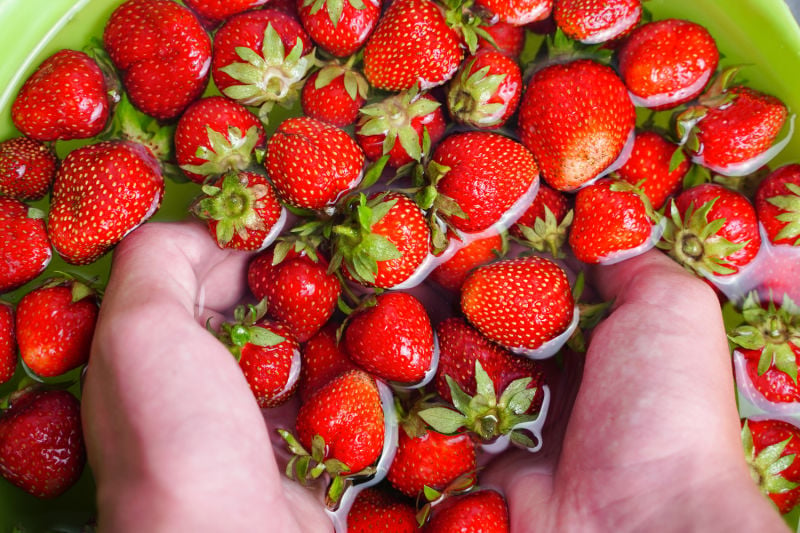
The good news is, we’re about to show you how to clean strawberries to effectively remove the unwanted surface nasties. It’ll also help them last longer in the fridge so let’s dive in.
Table of Contents
- How to clean strawberries with vinegar
- Other safe ingredients for cleaning strawberries
- How to wash strawberries with water
- Do I need to clean strawberries?
- Do strawberries have worms?
- Tips for washing strawberries
- Can you use dish soap for washing strawberries?
- Should I clean commercially frozen strawberries?
- What is the best way to clean strawberries if I’m making jam
- How should I store fresh strawberries?
- Summing up
How to clean strawberries with vinegar
Washing strawberries in a vinegar bath removes residue, bacteria, and dirt. It is also the first step you'll take if you want to store strawberries fresh for longer.
- Do a quick check of the berries and remove the moldy, bruised, or mushy-looking fruit. Do not remove the stems before washing.
- Fill a large bowl with 3 parts cold water and one part white vinegar, then stir briefly to combine.
- Add the strawberries to the solution for around 30 seconds. Gently move them around but don’t rub them as they’ll get damaged skin.
- Rinse the fruit under cold running water to remove any leftover vinegar then transfer to a clean, dry tea towel. Carefully pat them dry.
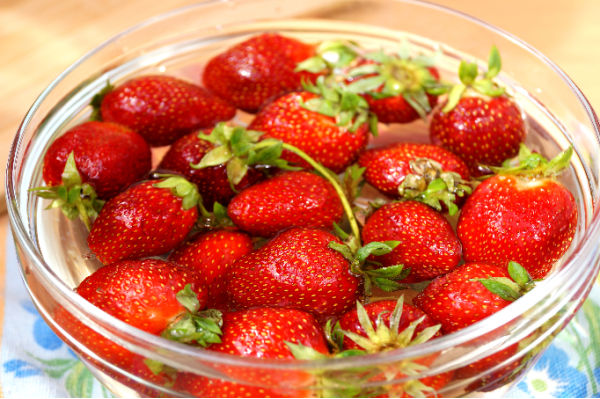
Other safe ingredients for cleaning strawberries
Veggie wash
You can also use veggie wash instead of vinegar. This product can be found in most grocery stores or online. Follow the above steps, checking the instructions to see how much veggie wash to use for one bath.
Apple cider vinegar
This vinegar works just as well as white vinegar, so it’s a good option if that’s all you have available. Keep in mind that apple cider vinegar costs a lot more than budget-priced white vinegar.
Salt bath
Add enough water to a bowl to just cover the fruit then add one tablespoon of salt for each cup of water. Allow the fruit to soak for 15 minutes before removing. This method not only cleans the surface of the fruit but also ensures any fruit fly worms are removed.
Baking soda
Sodium bicarbonate, or baking soda, is a low-cost pantry staple that’s a great option for cleaning strawberries. Use one teaspoon of baking soda for every two cups of cold water.
How to wash strawberries with water
Washing your strawberries in water is a good cleaning option if you don’t have time to make a bath. It’s a great method for cleaning organic strawberries which don’t have unwanted spray on their skin.
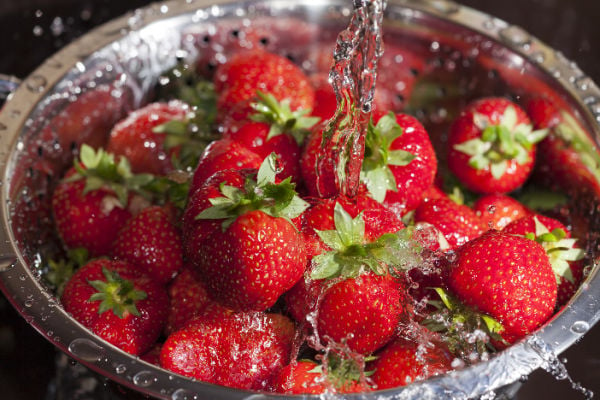
- Check the fruit and discard any that are damaged or moldy looking.
- Place the berries in a colander and hold them under cold running water. Carefully move the fruit to ensure they are washed all over.
- Lay on a paper towel or tea towel and pat dry.
Based on research carried out by the Centre for Science and Environment (CSE), washing strawberries in cold water expunges 75-80% of the fruit’s pesticide residue. That’s a good result - only 10% less effective than using a water bath with an ingredient like baking soda or vinegar.
Do I need to clean strawberries?
Each year the Environmental Working Group (EWG) publishes its Dirty Dozen List, which names and shames the top 12 fruit and vegetables prone to pesticides. Strawberries are always number one on the list so giving them a quick wash before eating is a sensible move.
The main risk that comes from eating unwashed strawberries is exposure to pesticides. There is also a risk of bacterial contamination that can lead to foodborne illness. Washing your fruit may not completely eradicate them, but it’ll reduce the risk.
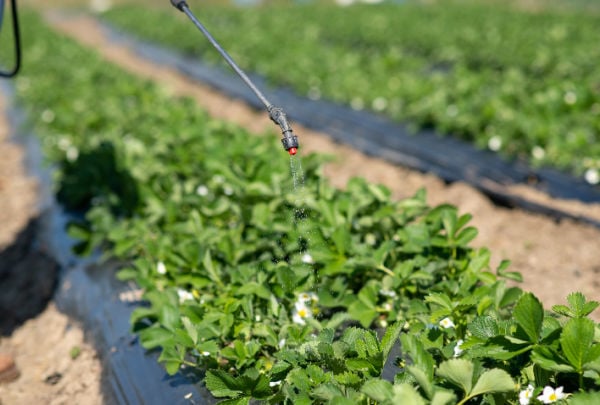
Do strawberries have worms?
Although store-bought strawberries are unlikely to contain worms, it is possible. Some varieties of fruit fly can make tiny incisions into the flesh and lay eggs inside the fruit. These can hatch into microscopic maggots that can’t be detected by the human eye.
Although eating them won’t harm you, it’s another very good reason to wash strawberries before eating.
Recommended uses for strawberries:
Make a delicious strawberry crostata.
Churn a pint of fresh strawberry ice cream.
Tips for washing strawberries
- Before rinsing berries, or any produce, wash your hands with warm water and soap first.
- Check the fruit before washing and discard any rotten, bruised, or damaged ones to avoid affecting the other berries.
- Wash strawberries before slicing them on a chopping board with other ingredients. You don’t want unwanted bacteria and chemicals finding their way into your smoothie, pie, or fruit salad.
Can you use dish soap for washing strawberries?
The FDA advises against using dishwashing soap to clean strawberries. Although it will effectively remove pesticide residue, you may end up ingesting leftover dish soap which hasn’t been tested for human consumption.
Should I clean commercially frozen strawberries?
If you’ve purchased a bag of frozen strawberries from the supermarket there’s a good chance they’ve been prewashed. Studies have found that fresh berries have roughly twice the pesticide residue as frozen ones. However, it’s still a good idea to give frozen strawberries a rinse to remove any residual spray and dirt that may have been missed.
What is the best way to clean strawberries if I’m making jam
It is best to wash fresh strawberries briefly under the tap before making jam. You don’t want the fruit soaking in water as they will soak up the liquid, making jam setting a challenge.
How should I store fresh strawberries?
If you have a lot of fruit, then a great option is to freeze strawberries. Do you think you'll consume the berries within one week? Check out our guide on how to store strawberries in the fridge.
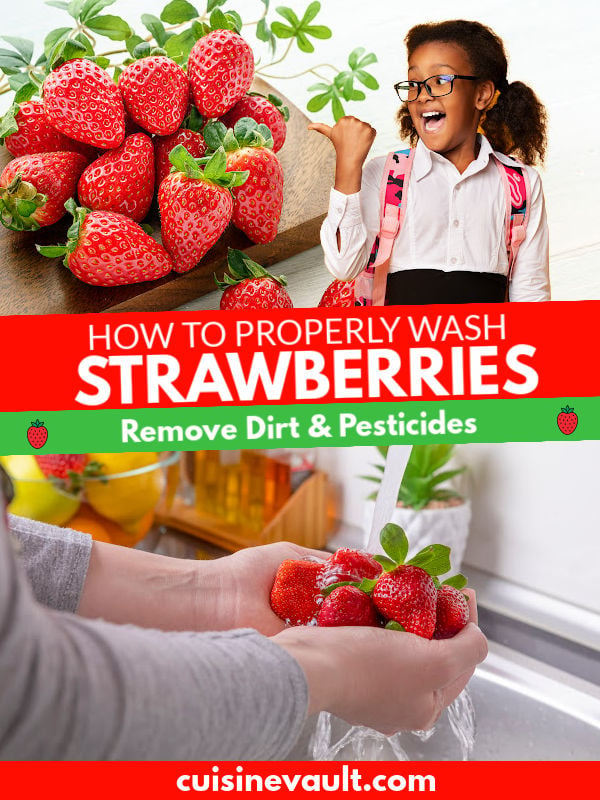
Summing up
It’s tempting to eat strawberries straight from the punnet, but it’s worth the effort to give them a quick wash first. The simple steps we outlined above will only take a couple of minutes and you’ll spare your body from harmful pesticides.
If you’re willing to spend extra, consider buying organic strawberries, which won’t come with unwanted chemicals. Of course, they may still have dirt on them, so it’s still wise to give them a rinse.

Leave a Reply